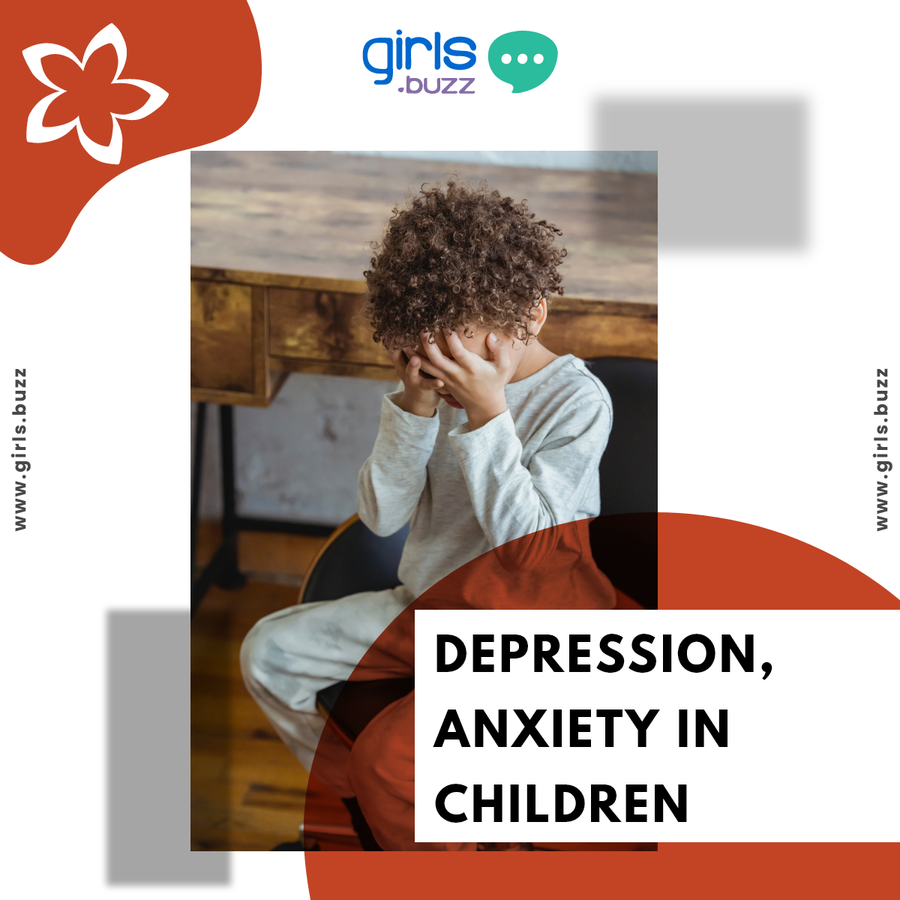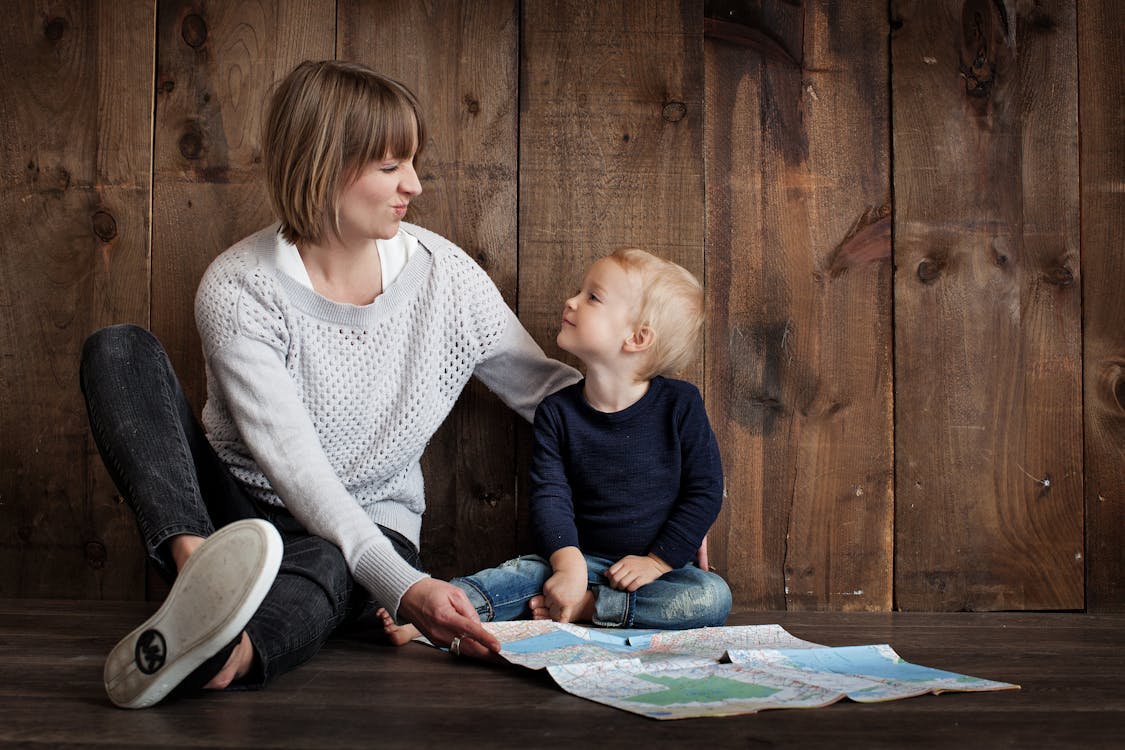Depression & Anxiety in Children – Causes, Warning Signs and Treatment
7 minuteRead

Depression is a serious medical condition. Although most people think it is an adult illness, it is prevalent amongst children and adolescents as well. However, anxiety in children often goes unnoticed because parents simply attribute it to unusual child behaviour. Well, it’s normal for a child to feel sad, irritable or to be in a bad mood. However, it’s alarming when these negative feelings and thoughts tend to last for weeks, months or even longer. As a parent, it is important for you to recognise the depression symptoms as soon as they appear. Neglecting it in their childhood can later manifest into adult depression. Recent studies reveal that school closure owing to the COVID-19 pandemic has heightened child depression. It is affecting their mental health as most of them are getting tired easily, miss their peers and teachers, and the overall school environment.
Manic depression can make children feel worthless and unlovable. In severe cases, it can even lead to them thinking about self-harm or suicide.
Are you still wondering if kids can be depressed or not? Well, though they don’t have large-scale stressors like adults, they too can undergo severe spells of anxiety.
If you suspect your child is suffering from severe anxiety or depression, this article is for you. We’ve chalked out all the things you need to know about child depression.
Common Causes of Childhood Depression
Experts suggest that depression in children may be the result of a combination of factors. One of the major causes of child depression is parent separation. When a divorce is occurring in a child’s life, he/she is likely to feel confused, anxious and lonely. However, it’s only a small piece of the puzzle. There are many other causes that contribute to childhood depression which are as follows:
- Environmental Factors
A chaotic or stressful environment puts a child at a major risk of developing mood disorders particularly depression. It can be an unstable home environment or rejection or bullying at school. Factors at home include divorce, a family death, social difficulties or birth of a sibling making the child feel lonely. However, it’s important to remember that not all children will be affected in the same way. Every individual is different. Therefore, in the event of family uncertainty, one child may develop depression while the other one may be able to deal with it in their own way.
- Physical Health
If a child is suffering from any chronic or severe medical condition, they are likely to get depression easily. This includes obesity too. They fear they will not be accepted by their peers and can become a laughing stock easily.
- Genetics
Research suggests that children with family members who suffer from depression are at a greater risk of developing depressive disorders, frequent anxiety attacks and mood changes. Thus, childhood depression does have a genetic link. In another scenario, when a child sees their parents mood swings, they too tend to imitate them thereby manifesting some form of depression. A parent should lookout for such signs and correct the child as far as possible.
- Neurotransmitters
When certain children have abnormal levels of hormones present, they tend to get depressed easily. The stress hormone – cortisol, is present in large quantities which may be a cause. Further, an imbalance in neurotransmitters and hormones plays a role in how the brain works which affects the moods and emotions.
- Traumatic Life Events
Traumatic life events can leave a lasting impression on the child. Sudden changes such as moving into a new home (which means leaving the existing neighbourhood and friends), school change or divorce can contribute to feelings of depression. If a child has also been a victim of abuse or assault, they might feel depressed and scared. This can even manifest into withdrawals from social situations.
Therefore, these are some of the major causes of child depression. Remember, having any kind of mood disorder isn’t a weakness. Don’t blame your child or self for it. Instead, recognise the warning symptoms or signs, and strive to get your child out of it.
Warning Signs of Depression in Children & Adolescents
As a parent, recognising the early signs of depression is of paramount importance. However, when a child is hitting puberty, their hormones are in a constant state of fluctuation wherein mood swings might seem normal. As a result, depression can even go unnoticed and undiagnosed. Not all moods are indicative of a depressive disorder but if your child is experiencing lengthy bouts of stress, they may be suffering from depression.
You as a parent can nip it in the bud by recognising the following signs or symptoms:
- Frequent sadness/crying spells
- Persistent boredom
- Social isolation
- Irritability/anger
- Lack of interest
- Low self-esteem
- Drastic changes in eating habits/patterns
- Feeling guilty or ashamed
- Fatigue, aches and pains
- Hopelessness
- Weight gain or weight loss
- Sensitivity to rejection or failure
- Poor concentration
- Social phobia
- Frequent absence from school
- Self-destructive behaviour
- Negative thinking
- Poor performance in school
- Aggressive behaviour
- Nightmares
- Increased problematic behaviour
- Crankiness
While these are the most common symptoms of depression in children, there are other warning signs that are child-specific. When the situation is getting out of hand, you must reach out to some form of coping mechanism or treatment for your child.
Child Depression: What Parents can do to Help & Treatment
Treating your child for depression can be daunting. He/she might feel tired, hopeless and overwhelmed. In the course of caring for them, you too might begin to feel sad and dejected. Well, hold on to your horses because during such times you’ve got to be there for them. One of the most important things you can do for your child or teen is understanding their plight by putting yourself in their shoes. Be as empathetic as possible. There are two routes you can take to treat child depression. One is by seeking professional help and the other is by creating a healthy and loving atmosphere at home where they can thrive.
As a parent, if your child has just been diagnosed with clinical depression, here’s what you can do to help:
Emotional Support
Your child/teen needs emotional support during such times and you may be the best person to help them. Strengthen your relationship with them by spending quality time, listening to what they have to say and encouraging them to have open conversations. It’s important to be compassionately curious. At no point you must come across as critical or judgemental. No matter how good your intentions are, if your child finds you interrogating them, they won’t open out to you. Instead, listen to them without the intention of fixing them.
You can ask them if something is bothering them at home or at school, make them understand the concept of bullying and try to gauge if they are victims of it. Whenever you have such conversations, it is important to gain your child’s trust. Knowing the warning signs will help you react accordingly.
Promote Well-being & Encourage a Healthy Lifestyle
Physical and mental health are closely connected. A healthy and active lifestyle can manage symptoms of depression. While you can’t order your child to have a healthy lifestyle, you can always help them improve their quality of life. Promote healthy meals that are full of green leafy vegetables and good carbohydrates. As far as possible keep them away from sugar-laden and fried foods.
Research suggests that physical activity can reduce the severity of depression. Encourage your child or teen to play a sport regularly or walk. You can even workout with them and become their exercise-buddy. After a day of good eating and play, quality sleep is important too. Make sure they get sufficient and consistent sleep. If your child doesn’t get enough sleep, they might feel tired and threatened too.
Treatment for Child Depression: Professional Help
For children and adolescents struggling with severe or chronic depression, different kinds of therapy and medication have proven effective. The treatment depends solely on his/her symptoms. For the treatment to yield results, finding a good clinician is important.
Psychotherapy
For children with depression, psychotherapy is the most effective treatment. It also involves individual therapy, group therapy and family therapy. It goes beyond the conventional therapy sessions. Based on the child’s depression symptoms, psychotherapists use different approaches to help the child. Some of them include:
- Cognitive Behavioural Therapy: CBT gives children the skills to cope with depressed moods or negative thoughts (like “nobody likes me”). The therapist actively engages in problem solving and getting rid of unhelpful thought patterns.
- Dialectical Behaviour Therapy: For children with severe depression, DBT may be helpful. The therapist focuses on teaching them to live in the moment, cope with stress better and regulate emotions.
- Interpersonal Therapy: In such type of therapy, the psychotherapist focuses on the problematic relationships of the child be it in school or within the family. Based on their discussion, they find out how certain relationships are affecting the child’s emotional state.
- Parent-Child Interaction Therapy: In certain situations, children are not competent enough to voice their feelings. The best way to engage them in conversation is by asking their parents to participate too in real-time coaching sessions. In such therapy, one of the parents interacts with the child based on cues given by the therapist.
- Play Therapy: In play therapy, a therapist uses puzzles, dolls, toys, drawings and games to help a child recognise, identify and verbalise their feelings.
Once you diagnose what your child is going through, make a safety plan. Seek therapy or medication if required. Professional treatment works. However, you have to be patient. Any kind of treatment or therapy only works if your child is invested in the process. Therefore, showing your child you care for them is extremely important.
Lastly, in the whole process, don’t forget to take care of yourself. It can be emotionally and physically exhausting for a parent to have a child suffering from depression. Know you’re not alone. Seek help from friends, family and loved ones. In the quest of making your child happy, don’t let go of yourself. Make sure you still step out, catch up with your friends over a cup of coffee and get the much-needed “me” time.
Write, Record and Answer! Consume Unlimited Content! All you need to do is sign in and its absolutely free!
Continue with one click!!By signing up, you agree to our Terms and Conditions and Privacy Policy.










